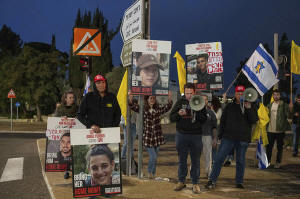Hurdles remain as Israel and Hamas once again inch toward a ceasefire
deal
 Send a link to a friend
Send a link to a friend
 [January 07, 2025]
By JOSEF FEDERMAN and SAMY MAGDY [January 07, 2025]
By JOSEF FEDERMAN and SAMY MAGDY
JERUSALEM (AP) — Israel and Hamas once again appear to be inching toward
a ceasefire that could wind down the 15-month war in Gaza and bring home
dozens of Israelis held hostage there.
Both Israel and Hamas are under pressure from outgoing U.S. President
Joe Biden and President-elect Donald Trump to reach a deal before the
Jan. 20 inauguration. But the sides have come close before, only to have
talks collapse over various disagreements.
The latest round of negotiations has bogged down over the names of
hostages to be released in a first phase, according to Israeli, Egyptian
and Hamas officials, who spoke on condition of anonymity because they
were discussing ongoing negotiations.
Israel wants assurances that the hostages are alive, while Hamas says
that after months of heavy fighting, it isn't sure who is alive or dead.
Other hurdles remain.
The first phase, expected to last for six to eight weeks, would also
include a halt in fighting, a release of Palestinian prisoners and a
surge in aid to the besieged Gaza Strip, according to the officials. The
last phase would include the release of any remaining hostages, an end
to the war, and talks on reconstruction and who will govern Gaza going
forward.

“If we don’t get it across the finish line in the next two weeks, I’m
confident that it will get to completion at some point, hopefully sooner
rather than later,” U.S. Secretary of State Antony Blinken said in Seoul
on Monday.
Here’s a closer look at the key issues holding up a deal:
The release of hostages from Gaza
During its Oct. 7, 2023, attack on southern Israel, Hamas and other
groups killed some 1,200 people and took about 250 hostages into Gaza. A
truce in November 2023 freed more than 100 hostages, while others have
been rescued or their remains have been recovered over the past year.
Israel says about 100 hostages remain in Gaza — at least a third of whom
it believes were killed during the Oct. 7 attack or died in captivity.
The first batch of hostages to be released is expected to be made up
mostly of women, older people and people with medical conditions,
according to the Israeli, Egyptian and Hamas officials.
On Monday, a Hamas official shared with AP a list of 34 names of
hostages it said were slated for release. An Egyptian official confirmed
the list had been the focus of recent discussions.
But Israeli Prime Minister Benjamin Netanyahu's office said the names
were from a list Israel had submitted months ago. “As of now, Israel has
not received any confirmation or comment by Hamas regarding the status
of the hostages appearing on the list,” it said.
A second Hamas official on Monday released a list of 14 names the group
claimed Israel had removed from consideration after they were approved
by Hamas and substituted with other names. Israel did not respond for a
request for comment, but it has pronounced the 14 people dead.
An Israeli official said the current impasse was due to Hamas' refusal
to provide information on the conditions of the hostages, while another
official said the departure of the head of the Mossad intelligence
agency for negotiations in Qatar was on hold.
A Hamas official, meanwhile, said that “no one knows” the conditions of
all of the hostages. Hamas officials have said that due to the war, they
cannot provide a full accounting until there is a truce.
Since the war began, over 45,800 Palestinians have been killed in Gaza,
according to local health authorities, who say women and children make
up more than half of those killed. They do not say how many of the dead
were militants.

[to top of second column]
|

Israeli demonstrators outside the prime minister's office in
Jerusalem hold photos of Liri Albag and other hostages during a
protest calling for their release from being held in the Gaza Strip
by the Hamas militant group, Sunday, Jan. 5, 2025. (AP Photo/Ohad
Zwigenberg)

Pausing the war or ending it?
Families of hostages reacted angrily to reports of the phased approach,
saying the government should instead be pursuing a deal that releases
all the captives at once. They say time is running out to bring people
home safely.
“This morning, I and everyone in Israel woke up and discovered that the
state of Israel has put together a Schindler's List — 34 people who will
be able to hug their families again, and 66 others whose fate will be
sealed,” said Yotam Cohen, whose brother Nimrod, an Israeli soldier held
hostage, did not appear on the published list.
Netanyahu has said he supports a partial deal that pauses the war, but
he has rejected Hamas' demands for a full Israeli withdrawal that would
end the war. Netanyahu has vowed to continue fighting until he achieves
“total victory” — including the destruction of Hamas' military
capabilities.
Israel has inflicted heavy damage on Hamas. But the group continues to
stage attacks in Gaza and to fire rockets into Israel. That could
portend an open-ended war that could drag on for months or years.
The Hostages Forum, a grassroots group representing many hostage
families, said it was time for a comprehensive deal.
“We know more than half are still alive and need immediate
rehabilitation, while those who were murdered must be returned for
proper burial,” it said. “We have no more time to waste. A hostage
ceasefire agreement must be sealed now!”
The release of Palestinian prisoners in Israel
As part of the deal, Israel is expected to free hundreds of imprisoned
Palestinians, including dozens who were convicted in bloody attacks.
Israel has a history of large-scale prisoner releases, and hundreds were
freed in the November 2023 deal. But the sides have disagreed over the
exact number and names of the prisoners to be freed. Hamas wants
high-profile prisoners included. Israeli officials have ruled out the
release of Marwan Barghouti, who tops Hamas' wish list.

Netanyahu's governing coalition includes hardliners who oppose such
releases, with some even pledging to quit the government if too many
concessions are made. They point to a 2011 prisoner release that
included the former Hamas leader Yahya Sinwar, a mastermind of the Oct.
7 attacks who was killed by Israel in October.
The return of Palestinians to their homes in Gaza
The war has displaced an estimated 90% of Gaza’s 2.3 million people,
according to U.N. estimates, with the hard-hit northern sector of the
territory largely emptied of its prewar population.
During the first phase of the developing deal, Israel is expected to
withdraw troops from Palestinian population centers and allow some of
the displaced to return home. But the extent of the pullback and the
number of people allowed to return must still be worked out, the
officials say.
___
Magdy reported from Cairo. AP correspondents Melanie Lidman in
Jerusalem, Abby Sewell in Beirut and Matthew Lee in Washington,
contributed reporting.
All contents © copyright 2024 Associated Press. All rights reserved |